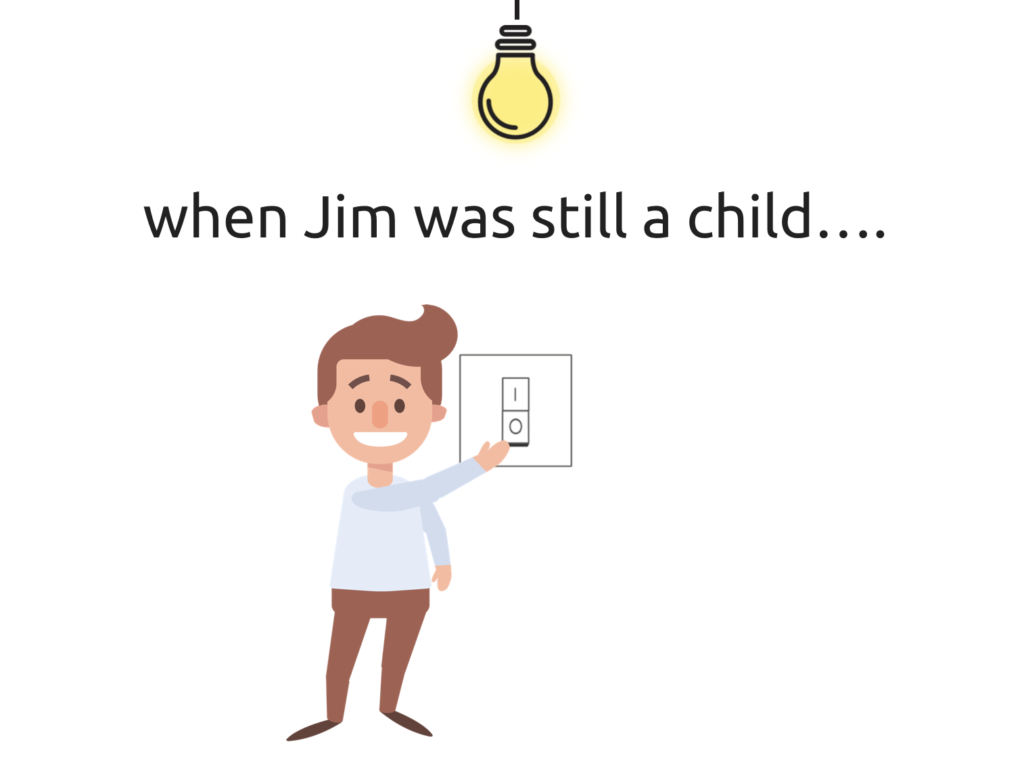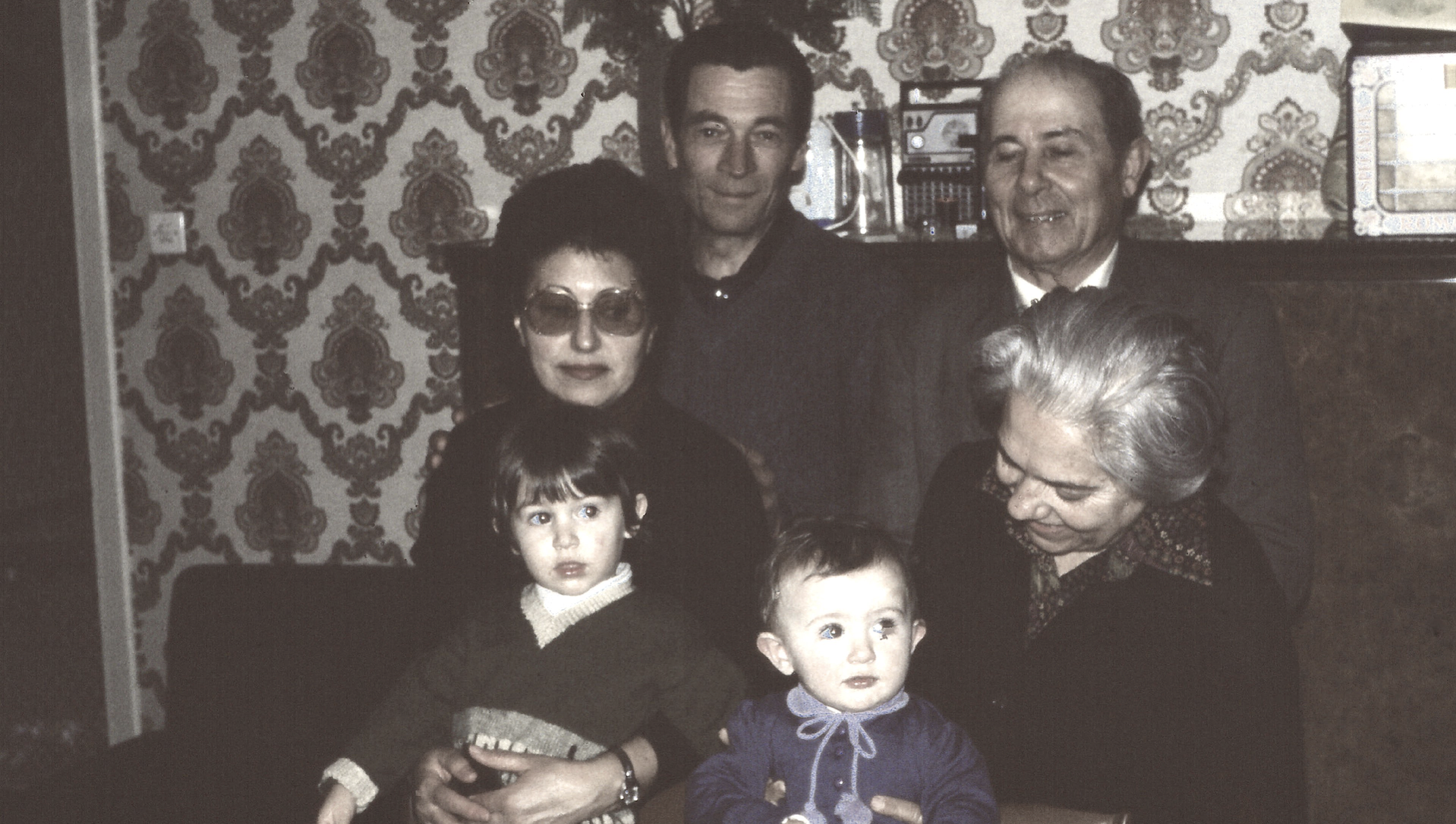The icebreaker
I usually begin my presentations with an icebreaker
I start with Jim as a little kid

Jim was having fun. He turned the light off and on. And off and on again. It was real magic. Just pressing a button on the wall he could make something happen. Something as beautiful as light. He probably needed to be sure he was not dreaming or wanted to drive his parents crazy. Fact is that he tried and tried again.
But Jim is not a kid anymore.
He forgot how fun it was to turn off and on the light.
Nowadays, when he turn off the light is because he wants to sleep. If he turn it on again he probably needs to wake up or read something. He does it with a purpose. He even forgot the switch. Until…

Until that same light does not turn on. Jim is uncertain at the beginning. Is it a temporary problem? Did I pushed strongly enough? Let me try again!
After a first feeling of uncertainty, he will experience anger. He need to call the electricians, he need to spend money and time on something he does not want. It is just a light! It should work!
Jim is in the middle of a relationship. The relationship between him and the switcher. And the first thing we build in a relationship, the very first things that provokes so many diverses is just there: THE EXPECTATION.
We push the button and we expect the light to turn on. It does not work, we feel disappointed. Why? We really need that light right now! How could it do that to me?

The power of expectation
During this summer I was flying to my home country (Italy) as every year, to visit my family and enjoying the sun.
One evening my kids and I were trying to cross the street and we had to wait five minutes until somebody was finally letting us going to the other side. And I was thankful.
When you do not expect for somebody to stop or better, when you are expecting nobody to stop, you will be thankful with the one being kind enough to let you use your right.
“How kind of him!”
But let’s be serious. I live since more than 15 years in Germany and I know my rights. I know that if I stop in front of a crossing street sign the auto has to stop. This is the law. Pedestrian are number one. Cars have to wait.
Try to drive a car and not to stop it in front of a pedestrian crossing the street in Germany. There will be people taking your number plate and more that one advising your behaviour to the police. And those people will get very angry. I do get very angry at people not giving me my right here in Germany.

Than: why am I thankful in Italy for the only one who let me cross the street and get angry when somebody stops to late (but still let me pass) here in Germany?
Homo-Adaptatio
We human are made for adapting. It is sometimes difficult to believe (when I have to show my grandmother how to use a new app) but we as human being are made flexible and ready to adapt. As kids we adapt to our body constantly growing, we adapt to new friend at school, to new colleagues, to new situations. Not always at the same speed and not everybody with the same enthusiasm, but definitely we are made for it.
I do remember having a Nokia mobile Phone and not being able to surf the internet with it. I did not have the necessity back then, and the internet was still something for nerds. But I also remember my first iphone. The first time I searched for information on my way to work. The first time I navigate with a gps google map to the place we were supposed to meet. If I now compare it to the fact that I will change website if it does not open during the first 3 seconds I could believe I am going crazy. I believe I will not be able to get to my own house sometimes without a navigator telling me where to drive.

I have adjusted to the new technology. So much that I give it for granted.
Yes, I will have internet everywhere I go.
Yes, I can communicate with my mother even from the other side of the world.
Yes, I will push the switch and the light goes on.
How can we make the better out of this?
Focus on the needs
We need to understand our target group. We need to write hobbies, family situation and works of our typical user. Without knowing our customer we cannot understand his needs and his expectations.
Once we understood for who we do the job, we should put ourself in his shoes and understand why they visit our website. For as much as we like telling the user about our history we should understand that this will not be the main reason the user will visit our website.
It is crazy but there are still examples out there of websites selling a service or a product only on the second or third page. If you have a product with a good marketing concept people will come to your website and buy it. It is so easy. Everything in between, every information you believe should find its place before letting the customer buy your product is in the wrong place.
It is in the customer interest and normal behaviour to find additional information to the product. But the option to buy it should be the first. The rest is, as said, additional.

Let’s imagine to be in the middle of the night. Everything is very dark and we hear some noises. We want to turn on the light and instead of the switcher we find a post-it note telling us about the history of the light and how cool and highly intelligent our engineers are. Or we push the switcher and instead of seeing the light a voice begin explaining us about the best way to produce green light and Kilometer 0.
Do not let me take away your imagination too much. You know what kind of reaction you would have.
Why do you do that to your customer?
Fulfilment is contagious
Great Expectations are for dreamers. It’s not by case that Charles Dickens “Great Expectation” is ranked as the 4th British novel of all times. A poor boy trying to change his life. “The pursuit of happiness” or lately “A star is born” or even ” The queen”, all prised stories following the same plot: daring is worth and never stop dreaming. Why do we love those movies? Because they let us believe that one day it could happen to us.
Now, there is a huge difference between being satisfied because the light goes smoothly on when we push the switcher and becoming a star.

Do you remember the young Jim? The one who loved driving his parents crazy and was fascinated by the magic of electricity? I began my presentation with him only to come back now and remember that there is a little kid in all of us and we all loved enjoying and having fun turning on and off the light. In this simple switch you can summarise all UX theories.
In this case we should also remember that we are all dreamers expecting something. For nature.
Let’s not disappoint those expectations.


